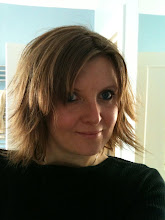"In the beginning was the word and the word was ours..." From Michael Rosen's poem, "Words are Ours"
Above: me, reading to my daughter, aged six weeks.
I can distinctly remember the first time I read The Gruffalo to my daughter. I was 38 weeks pregnant with her, my little baby who was tucked inside me, curled up in a tight spot, and probably wondering where all the Room had gone.
I had one of those big bouncy ball things that are great for exercising, toning up wobbly bits, sitting on to do figure-of-eights to try to get Baby into the optimal birthing position, and great for using in labour. They're also a pain in the neck to store safely without them taking out a small child like a bowling ball, but that's another story...
On this particular occasion I was sitting on the ball whilst reading The Gruffalo aloud to both my daughter and my husband. "Are you paying attention?" I asked him. He looked a bit distant, but nodded. "Good. Because you're going to get to know this book very well!"
I continued reading to the end, at which point my hormones got the better of me, and I shed a tear. I felt quite soppy at the time, mostly because it was the first book I ever bought to read for my baby, and reading it for the first time felt almost like a ceremony, a beginning of something.
But I read that book every day until she was born, and we continued to read this book, and lots more besides, every day to both of our children.
It is so important to read to our babies. Why? Because it helps them with their vocabulary and speech development; it helps them make an association with words and pictures; and it is great for bonding, too. It also sets a habit in place, where reading is an integral part of their daily life, intended for pleasure, cuddles, fun, laughter and chats about what's happening in the book. Here are some tips on reading with your baby.
However, it doesn't stop with reading. Talking through what you're doing whilst holding your baby, walking around with them, pushing them in a buggy, carrying them in a sling, bathing them, peeling potatoes, putting the rubbish in the bin, tidying up - anything and everything can be verbalised with your baby. Communicating with them, explaining what you are doing - even explaining that you're going to change their nappy and the reason why, in simple language, is not only respectful (even if you're unsure whether they understand or not, if you consciously do so repeatedly, they will soon learn what the word "nappy" means and what that soggy uncomfortable feeling is), it is engaging them in what you are doing, and it enables the baby to understand more about the world they are getting to grips with.
My son particularly enjoyed lots of time in the sling. I would alternate between having him facing me, and facing outwards, so that he could see what I was doing. He enjoyed watching me prepare food, and I would give a commentary on what I was doing: "I'm peeling this carrot which is orange. Can you smell the food I'm burning in the oven? That's because Mummy forgot it was in there until now! Oh, look, it's raining outside! I'll have to bring the washing in, now!" etc. That was a typical day for me, but I digress...
The National Literacy Trust has tips and suggestions on how to communicate with your baby, and includes their qualitative research report for their face-to-face project. One of the most fascinating facts is that at birth, a baby's brain has an enormous capacity for learning, and the greatest potential for learning is within the first two years of its life. So if you feel self-concious about talking to your baby, remember that it is helping their speech development, and it is developing your bond with them, too. The more you talk to them, the more natural it becomes.
When they start talking to you, it becomes a fascinating new experience and insight into how they view the world. Allowing them to ask questions, listening to what they are saying, repeating back to them, are all important aspects of communication. When they learn what the word "no" means, everything changes again, but that's the joy of parenting: it is a constantly-changing whirlwind experience!
But for me, the most rewarding aspect of reading to my daughter, is that she reads to me, now. It is a wonderful gift to hear your child read to you, not only understanding what the word means, but to be able to explain the text in their own language and relate it to their own experiences or ideas. Of course, spelling out words that she previously didn't know, such as "Could you pop to the shop to get me some c.h.o.c.o.l.a.t.e, please?" no longer holds any water, as she's onto me in a flash. Perhaps that's why I've lost a bit of weight, lately...


No comments:
Post a Comment